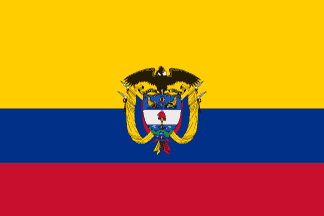 image by Zoltán Horváth, 9 May 2024
image by Zoltán Horváth, 9 May 2024
Last modified: 2025-01-11 by daniel rentería
Keywords: colombia | president |
Links: FOTW homepage |
search |
disclaimer and copyright |
write us |
mirrors
 image by Zoltán Horváth, 9 May 2024
image by Zoltán Horváth, 9 May 2024
Flag used since 2021
See Also:
Other sites:
Ratio 2:3. Adopted: 9 November 1949. In use except small
changes of the shield. Normally it has been used with a bordered
red circle. Often in the red it has been written in gilded
letters: Republica de Colombia - Presidencia (or Presidente). The
executive decree that creates the flag does not mention neither
the red circle, nor the inscription.
Jaume Ollé
Presently, a presidential falg also exists. It is the national
flag with a white circle at the center, the circle is bordered by
a red line. Inside the circle is the coat of arms. The
inscription "Presidencia de la República" is on the
red line. This flag is also used by other government institutions
of the three branches, but they change the inscription
accordingly (e.g., "Senado de la República" -senate-,
"Ministerio de Defensa - defense minstry , "Corte
Suprema de Justicia" -supreme court, etc...)
My source is "Banderas y Escudos del Mundo EASA",
Editorial América S.A., 1986., as well as personal experience
Jaime Vengoechea, 10 April 1999
Concering 'Pavillons nationaux et marques distinctives' [pay00], Fig. 2 (naval ensign) - Note 1 says in
wartime it have red border around the disk containing the Coat of
Arms, Fig. 7 is presidential flag, being the national flag with
red bordered white disk with Coat of Arms. Are they the same?
Željko Heimer, 9 January 2001
Not exactly (different dimension of red ring).
Armand du Payrat, 9 January 2001
The info above mention that the presidential flag often bears
gold inscription "Republic of Colomba - President" (in
appropriate language, of course). However, it is also said that
the legislation does not prescribe the red border at all (in
presidential flag). The same flag as presidential (or maybe as
naval during wartime) is apparently used by various govermental
offices, with appropriate inscription in red border. But, maybe
that is not the state ensign described, but rather the indoors
flags of those offices.
Željko Heimer, 12 January 2001
On presidential flag the red ring is smaller in diameter then
the naval ensign and not
reaching (or just touching, depending on source) the red stripe.
Željko Heimer, 17 May 2001
At [pay00] - President of the
Republic (2:3) - National flag with the Coat of Arms on white
disk surrounded with a red ring. This might include golden
inscription (as it seems from some images on www.presidencia.co that
the version without inscription in used (sometimes?) for table
flags and similar). Though, what's exactly inscribed in the ring
is not quite clear, and the reports above are two- (or even
three) fold. It may be that the exact wording is not prescribed
and maybe it depends on the manufacturer. On top there are the
uninscribed version and one with inscription according to my
interpretation (based on one of the possibilities reported
above).
Željko Heimer, 20 May 2001
In the Presidencial Flag the inscription REPUBLICA DE COLOMBIA
and the inferior part of the circle LIBERTAD Y ORDEN.
Felipe Carrillo, 16 November 2002
The flag with red ring (no inscription) appear at Fachinger
Collection - Plate 6 as: "Colombia".
Jaume Ollé, 12 June 2004
Here is a photo of the
Colombian elected President Álvaro Uribe Vélez when he took
office, on August 7th, 2002 (His term is due on 2006) with the
presidential flag and presidential sash.
E. R., 22 March 2005
There is a photo of a
flag at today's NY Times after the rescue of the FARC hostages.
It contrasts with what we have in that the seal extends only
halfway into the blue stripe. The inscription on this flag reads
simply "REPUBLICA DE COLOMBIA".
Albert S. Kirsch, 4 July 2008
According to the latest legislation
on Colombian flags, in Article No. 8 of Decree No. 1967 of August
15, 1991 it says that the Bandera Nacional (National Flag), the
official name of the Colombian flag, can only be used with the
Coat of Arms by the President and the Armed Forces, being called
Bandera de Guerra (War Flag). Then on Article No. 12 it says that
the Coat of Arms can be used in the Bandera Nacional del
Presidente de La República (President of the Republic National
Flag), official name of the Presiden'ts flag, War Flags, and
official documentation.
E. R., 25 August 2008
 image by Jaume Ollé, 27 October 2001
image by Jaume Ollé, 27 October 2001
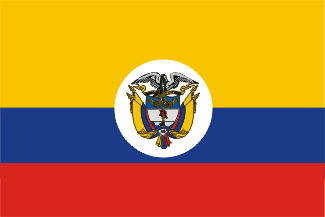 image by Jaume Ollé, 27 October 2001
image by Jaume Ollé, 27 October 2001
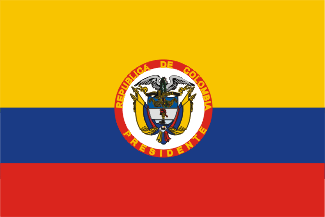 image by Jaume Ollé, 27 October 2001
image by Jaume Ollé, 27 October 2001
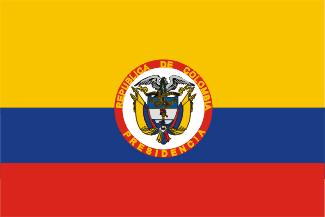 image by Jaume Ollé, 27 October 2001
image by Jaume Ollé, 27 October 2001
Presidential flag as legislated (never used), and the
three patterns really in use.
Jaume Ollé, 27 October 2001
 image located by Paul Bassinson,
1 July 2023
image located by Paul Bassinson,
1 July 2023
A variant of the Presidential flag of Colombia obtained from
https://www.facebook.com/photo shows the arms rotated to be viewed on a
draped flag.
Paul Bassinson, 1 July 2023
This version even though resembles a Presidential flag is actually a variant
of the country's flag featuring two five-pointed stars, very similar (in design)
to the 1955 sash as well as the previous one. Again, this
design takes elements from Presidential flags and sashes and incorporates them
into its own.
Esteban Rivera, 2 July 2023
1) 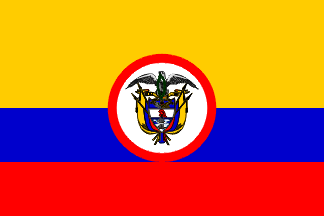 image by Željko Heimer, 20 May 2001
image by Željko Heimer, 20 May 2001
2) 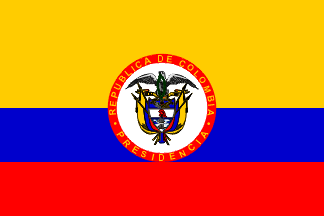 image by Željko Heimer, 20 May 2001
image by Željko Heimer, 20 May 2001
These flags are displaying the 1955 Coat of Arms.
E.R., 25 August 2005
The flag
featuring the 1955 coat of arms is
supposed to have the letters more closely together, as this other
image. The source for
this comment is the Presidential flag that appears in
this official stamp commemorating
the life of one President who was sworn in office between 1978 and 1982. Closeup
of the image (in which the Presidential flag is seen) can be located
here.
Esteban Rivera, 05 April 2016
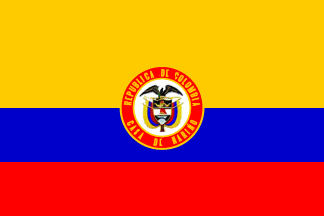 image by Eugene Ipavec, 2 July 2006
image by Eugene Ipavec, 2 July 2006
There is an image of the President of Colombia (Álvaro Uribe
Vélez), with the Colombian tricolor on the background and the
flag of the Casa de Nariño (Nariño's House), which is the
Presidential house. The flag is the same as the Senate flag, only instead of the word
SENADO, it should be CASA DE NARIÑO.
Source: www.armada.mil.co.
E. R., 2 July 2006

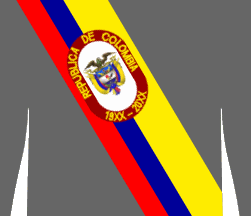 image by Eugene Ipavec and Francisco Gregoric,
5 July 2006
image by Eugene Ipavec and Francisco Gregoric,
5 July 2006
2002-2006 sash
The only difference regarding other countries that I've had
the chance to see their presidential sash (like Venezuela, Chile
or Bolivia) is that the Colombian Presidential Sash has the Coat
of Arms with red outline and on the top: REPUBLICA DE COLOMBIA
(in golden letters) and on the bootom the presidential term
(usually other countries' shashes do not include the Presidential
term). So for this last President (Alvaro Uribe Velez), his term
is 2002-2006 (in golden letters), and so you can read this on the
bottom of the sash.
Source: www.latinamericanstudies.org.
E. R., 5 July 2006
Today Colombia's reelected President takes charge for the
2006-2010 term. He will use the same Presidential Sash that he
wore during the inauguration ceremony, back on August 7, 2002.
The only change will be on the years that appear on the Coat of
Arms.
E. R., 7 August 2006
Variant

 image by Eugene Ipavec and Francisco Gregoric,
21 July 2007
image by Eugene Ipavec and Francisco Gregoric,
21 July 2007
I found a variant of the Colombian Presidential Sash. During
Álvaro Uribe's second term as President (2006-2010), he is
wearing a sash without a red fring around the Coat of Arms.
Source: Colombian
Presidency official website.
E. R., 21 July 2007
1910-1914 sash

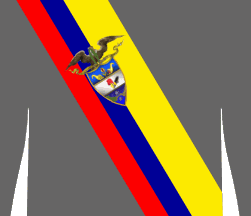 image by Eugene Ipavec and Francisco Gregoric,
17 June 2009
image by Eugene Ipavec and Francisco Gregoric,
17 June 2009
I found some pictures showing Carlos Eugenio Restrepo who was
President of Colombia between 1910 and 1914. In these pictures
you can see the Presidential Sash with the Coat of Arms used at
the time, the simple Coat of Arms (that is no flags on the sides
as ornament) with the Andean Condor on top.
Sources: www.lablaa.org,
wikipedia.
E. R., 17 June 2009
1955 Sash

 image by Eugene Ipavec,
29 July 2011
image by Eugene Ipavec,
29 July 2011
The original sash worn by General Gustavo Rojas Pinilla during his
inauguration as President of Colombia is displayed at the Museo de la Policía
Nacional (National Police Museum).
It has the same structure as the other sashes (Colombian tricolor) plus the coat
of arms
Image taken on March 3, 2010. The sash
features the 1955 version of the coat of arms of
Colombia and on the bottom fringe surrounding the coat of arms, is "13-VI-53",
meaning June 13, 1953, the day he was inaugurated. Also notice two jewels
(probably a ruby) on each side of the embroided date.
Funny to notice, is that even though the sash shows 1953 as its date, it
featured the 1955 coat of arms, which leads me to think that the 1955 coat of
arms was in use before it was officially adopted.
Esteban Rivera, 21 July 2011
This image that describes the 1955 Presidential Sash is actually mistaken,
since it portrays the current coat of arms, and it should feature the
1955 Coat of Arms instead.
Esteban Rivera, 06 April 2014
'World News Today' on BBC4 tv in the UK (and also, I believe,
on BBC World tv) had a report from Colombia on 9 June 2008 which
included an interview with the Vice-President. A close-up showed
that the flag behind him was the Vice-Presidential flag and
the seal does indeed extend just part-way into the blue stripe.
The separators between the top and bottom sections of the ring of
wording are more like tildes rather than bullets.
André Coutanche, 4 July 2008